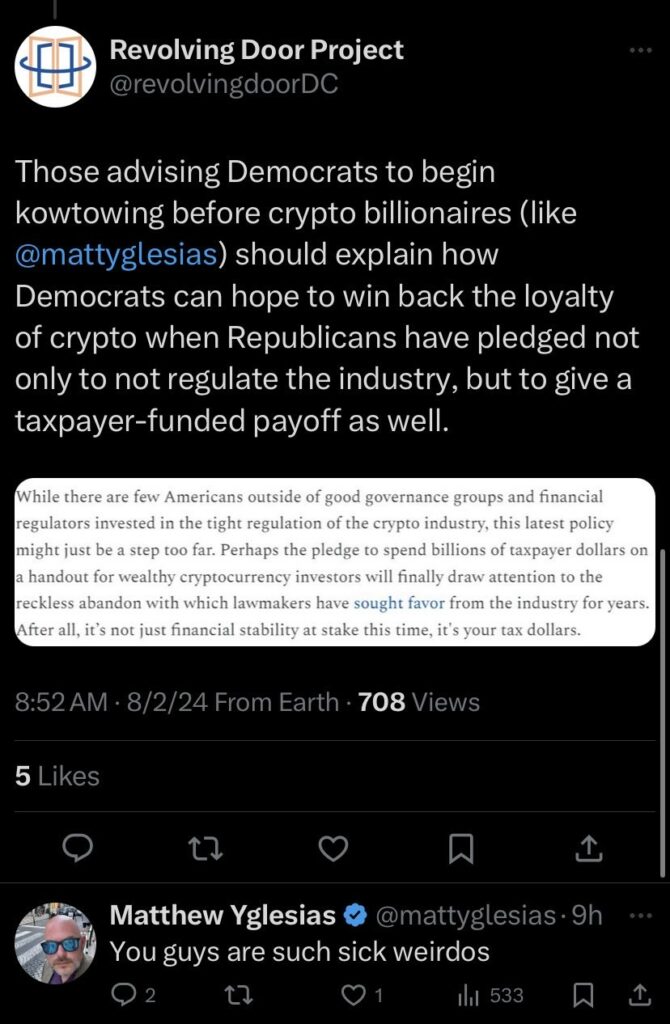He recognizes it’s unstable and an asset to criminals. But that isn’t enough of an issue for him.
A few weeks ago, Matt Yglesias called us “sick weirdos” for asking how far Democrats should go to win back the support of cryptocurrency investors from the Republican Party given Trump’s pledge to inflate the value of bitcoin using US taxpayer dollars. It’s clearly a sensitive issue for Yglesias.
Given recent meltdowns in the cryptocurrency world about a rumor that Gary Gensler would head Treasury under a Harris administration (a rumor that has resulted in massive meltdowns despite having no basis in fact) and that a prominent Democratic donor pulled his support from a prominent crypto SuperPAC, we thought it timely to publish something on Yglesias’ on-again off-again support for the industry. Afterall, what better endorsement of a political cause than an industry panicking over a rumor it created itself and a donor belatedly realizing his own SuperPAC was tanking the party he supports?

So let’s dive into Yglesias’ weird history with cryptocurrency.
Yglesias’ trust in crypto first came to our attention when he declared Sam Bankman-Fried “for real” after (so far as we can glean) having drinks with him one time. This declaration, 6 months before SBF’s house of cards came toppling down in one of the largest frauds in US history, stood in sharp contrast to our approach of “do not trust the billionaire spending tens of millions of dollars on lobbying and election spending to advance the business of virtual Beanie Babies.” Yglesias found this approach to be untenable, saying “it’s very bad that this kind of approach has come to play a meaningful role in executive branch staffing.”

Unsurprisingly to everyone not named Matt Yglesias, in a candid DM-interview after his downfall, SBF said of his convoluted system of ethics that Yglesias had bought hook line and sinker, “It’s not true, not really.”
Since then, Yglesias has seemingly become far less trusting of crypto. The day after SBF’s confession via Twitter DM, Yglesias praised the regulatory system that had kept crypto separate from the US financial system, protecting real financial institutions from the risk posed by the instability of crypto.

Just a month later, Yglesias gave a much more mealy-mouthed answer when asked about crypto, saying he believes in regulation but that he’s unsure who should be the regulator of crypto (the SEC, or, as SBF had lobbied for, the CFTC). He also was unsure what the purpose of crypto regulation should be.

After this, Yglesias acknowledged that much of the value of crypto lies in its use for money laundering.
On this he is not wrong. It’s one of the reasons why crypto has been hiring as many national security and former Treasury officials as they can.
But, as Yglesias has become divorced from the shock of the FTX collapse, his approach to cryptocurrency has softened. At the end of July, he recommended VP Harris agree to weak regulations for bitcoin in order to show she was more moderate than Biden.

In a series of tweets, he followed this up by declaring that there were no drawbacks to giving the crypto industry the regulations they had long been fighting for. No longer does he seemingly find money laundering or financial system instability to be a problem. To Yglesias it’s simply not clear that there’s “some sort of big tradeoff.” Rather than opposing the industry agenda for policy reasons (ones that he has expressed not that long ago), Democrats simply find bitcoin “cringe.” Never mind that crypto was able to topple several banks just last year despite the traditional financial system’s purported insulation from crypto. Or that crypto was implicated in the funding for Hamas’ Oct. 7th attack on Israel. Or that the proliferation of crypto has enabled an explosion of ransomware and other cyber crime.
Crucially, Yglesias is unable to even point out how it would help electorally. Recent polling – from the cryptocurrency firm Paradigm no less – shows that among non-Harris voters, more believe that the Biden administration is either too soft on crypto or is taking the correct approach than believe that they are too harsh on the industry. And more than all three of those options, most voters simply do not know (or do not care).
We hold the position that crypto should be regulated by existing securities law rather than a special set of weaker rules enforced by a statutorily weak agency. Rather than allow an industry to demand regulators alter existing law in order to ensure greater profitability, we want regulators to bring the industry into compliance with existing securities laws. If this happens to dampen enthusiasm for a financial product that consumes absurd amounts of electricity and contributes to crime then so be it. For someone so invested in cracking down on crime, Yglesias should oppose weakened regulations for products like crypto, which make ransomware attacks more profitable and feasible, and enables far more dangerous crime as well.

So what is Yglesias’ stance on bitcoin? You tell me. But we cannot detect a well thought out policy position. He seems to have projected his own approach to the subject on the Democratic Party as a whole. At the end of the day, it’s just vibes.

